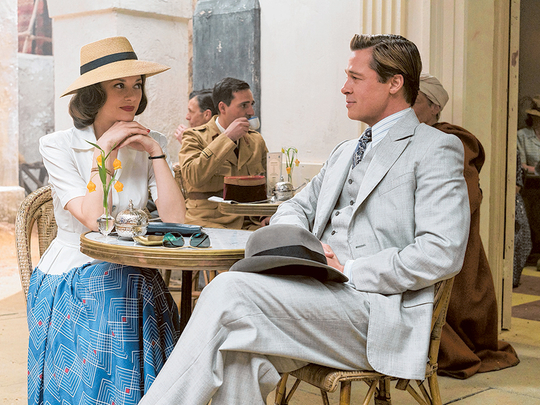
In a world of franchises, reboots and comic-book films, the original espionage thriller Allied is a comparatively bold gamble for a studio. Glamorous, serious, and classically made (with a healthy dose of CGI), Allied, from director Robert Zemeckis and screenwriter Steven Knight, looks to hearken back to a bygone Hollywood of David Lean epics and sweeping romances between larger-than-life movie stars.
In Allied, the would-be Bogart and Bergman are Brad Pitt and Marion Cotillard, who slip into sumptuous period costumes and settings to tell the story of a pair of Second World War-era spies, in Casablanca and then in England, who fall in love amid the turmoil of war. Their happy existence is put into doubt, however, when Max’s (Pitt) superiors inform him that they suspect Marianne (Cotillard), now his wife and the mother of his child, is a double agent.
“It’s rare that we can still do movies like this one — very deep love stories with original subjects and surprising stories,” Cotillard said. “It is this very entertaining movie with very strong and powerful feelings and real questions about love and war.”
Zemeckis was pleased that his leads looked natural and of the time in the clothes.
“Sometimes you put period costumes on contemporary actors and they look like they are dressed up,” Zemeckis said. “But they were able to carry those costumes in a way that looks absolutely right.
The costumes, by Zemeckis and Steven Spielberg favourite Joanna Johnston, proved essential for the characters too. Cotillard calls her wares “another layer of the skin.” She was also delighted to be sporting garments similar to her childhood idols like Ingrid Bergman and Katharine Hepburn.
“I would watch actresses in glamorous movies and it was part of my dream to be an actress,” she said.
On set, Cotillard also became a de facto teacher for Pitt, who had to master a French-Canadian accent for his role.
“It was a lot of stress for him, a lot of stress,” she said. “He was working every day. I helped him by being very honest. That’s the only way you can be pushed to your best. I was very impressed by his dedication.”
Pitt, who is going through a divorce from Angelina Jolie Pitt, was not made available for interviews in Los Angeles. The intrigue of one of the most high profile celebrity divorces in recent years also became unexpectedly linked to the film when rumours circulated that he’d had an affair with Cotillard.
It wasn’t helped when Paramount dropped the first trailer for the film just a few hours after news broke of the Pitt/Jolie divorce, seemingly suggesting a Mr. & Mrs. Smith in the Second World War angle. Zemeckis insists was a coincidence and not a salacious way to drum up excitement, although he laughs that he knows no one believes that.
However the speculation spun so out of control that Cotillard, pregnant with her second child with longtime partner Guillaume Canet, resorted to issuing a statement to the press denying the rumours.
Cotillard shrugged off a question about what that experience was like for her to go through.
“I had nothing to deal with, seriously,” she said. “I said everything I had to say about it. I’m not the one who is in the very complicated situation.”
When asked about doing some promotion of the film without Pitt, Cotillard’s publicist jumped in that they had nothing more to add on the subject.
“We love the movie. We are very proud of it and we’re very proud to share it today with the audience and the media,” Cotillard said after the interruption.
Indeed, the audience is a big question for the film, which cost a reported $85 million to produce.
The film turned out to be a bigger visual effects endeavour than Zemeckis originally planned. They didn’t have the budget to build everything and, thus they compromised by building a little and using digital set extensions to create the very specific wartime locations in the script.
Zemeckis is no stranger to pushing boundaries in filmmaking, and knows full well how devastating it is when it doesn’t connect with audiences. Last year his ambitious The Walk made only $10.1 million (Dh37.08 million) domestically against a $35 million budget.
“It was horrible,” Zemeckis said of the response. “I think it’s my best movie. It’s disappointing when people don’t want to see it.”
He’s not optimistic, either, about the future of the medium when audiences just don’t seem to be interested.
“I just don’t know what the future of movies is going to be. It’s starting to look more and more like, ‘We’re done making movies now,’ if people don’t go. It’s a business,” he said. “All that filmmakers can do is try to do the best work that they can, but if we’re in a situation where the audience is ambivalent and doesn’t care, you can’t force people to go to a movie. Nothing lasts forever.”
Cotillard is a little more positive.
“I’m pretty sure people will still want to be surprised,” she said.













